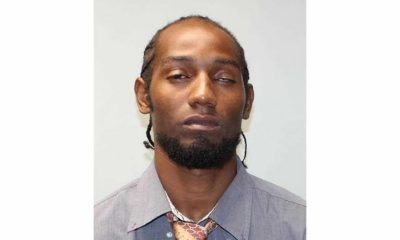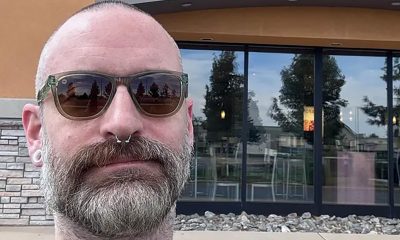Local
Jury rejects hate crime charge in gay murder
Defendant found guilty of slaying victim in bedroom

A D.C. Superior Court jury on Tuesday found District resident Justin L. Navarro, 25, guilty of first-degree murder while armed for stabbing a gay man at least 15 times in the back seconds after police said he referred to the victim as a “faggot.”
But the jury declined a request by prosecutors that it designate the Nov. 6, 2009 murder of District resident Kevin Massey, 31, as an anti-gay hate crime.
“The U.S. Attorney’s office had charged the defendant with committing this murder because of Mr. Massey’s sexual orientation, but the jury did not make that finding beyond a reasonable doubt,” the office said in a statement.
In addition to handing down a first-degree murder conviction, the jury found Navarro guilty of obstruction of justice, tampering with evidence, and carrying a dangerous weapon. He faces a minimum sentence of 30 years in prison and a maximum sentence of life in prison.
“This murder was marked by an unspeakable brutality,” said U.S. Attorney Ronald C. Machen Jr. “Today’s first-degree murder conviction ensures that the defendant will be held accountable for this senseless and deplorable act of violence.”
Machen told the Blade his office couldn’t discuss certain specifics, such as the jury’s decision not to convict on the hate crime charge, prior to sentencing, which is scheduled for May 24.
A law enforcement source said juries sometimes find it difficult to grapple with bias-related charges in criminal cases because it’s hard to prove beyond a reasonable doubt whether a defendant used bias or hatred as his or her motive in committing a crime.
D.C. Police Chief Cathy Lanier said the department is committed to “fully investigate” hate crimes.
“In this case, MPD investigators worked diligently with the United States Attorney’s office to gather all of the facts that were available,” Lanier said. “It is unfortunate that the jury did not find in favor of the hate bias enhancement.”
The verdict in the case came two days after Machen and D.C. police officials joined LGBT activists in speaking at a community forum on anti-gay hate crimes hosted by Foundry United Methodist Church near Dupont Circle.
Machen told forum participants about his office’s prosecution of Antwan Holcomb, 21, who was convicted March 1 by a D.C. Superior Court jury of first-degree murder while armed in the December 2009 murder of gay District resident Anthony Perkins. Witnesses testified that Holcomb was overheard boasting about meeting Perkins on a gay telephone chat line and luring him to a secluded spot in Southeast D.C., where he shot him in the head inside Perkins’ car.
Machen told the forum his office considered but ruled out charging Holcomb with a hate crime in connection with the Perkins murder.
A statement released by the U.S. Attorney’s office said witnesses testified during Navarro’s week-long trial that he became angry at Massey about a month before the murder when people saw someone carry him out of the apartment building where Massey lived while his pants were falling down.
The statement says witnesses saw Massey lean over to “pull up the defendant’s pants for him” while teenagers began laughing at Navarro. Some of the teens began teasing Navarro by “saying Mr. Massey was going to make the defendant ‘his next bitch,’” the U.S. Attorney’s office statement says.
The statement says witnesses reported that Navarro turned toward Massey and gave him the “evil eye.”
A source familiar with the case said the building where Massey lived was known as a place where illegal drugs were sold and sometimes used. The source said Navarro was being carried out of the building with his pants falling because he was highly impaired due to alleged drug use and apparently was unable to walk.
According to the statement, during the following month, Navarro became the target of rumors questioning his sexual orientation. It says that on at least one occasion he was overheard “loudly denying the rumors and vowing to kill Mr. Massey.”
On Nov. 6, 2009, Navarro knocked on the door of Massey’s apartment at 4211 2nd St., N.W., and asked, “Where’s the faggot,” the statement says. It says someone answered the door and told Navarro that Massey was in the bedroom.
The statement says witnesses reported that Navarro then went into the kitchen, grabbed a “large butcher knife,” walked into the bedroom and “without any warning began stabbing Mr. Massey repeatedly.”
It says Massey died on the scene. An autopsy later revealed that he had been stabbed between 18 and 20 times, including 15 times in the back.
“In the days that followed, the defendant threatened witnesses, burned his clothes, and told relatives he would not be around for a while,” the statement says. “Five days after the murder, the Capital Area Regional Fugitive Task Force arrested the defendant in a hotel room in Southwest D.C.,” the statement says.
The statement says that during his trial, Navarro testified that he acted in self-defense, saying “he did not know Mr. Massey and that Mr. Massey attacked him for no apparent reason.”
Says the statement, “The defendant testified that he believed Mr. Massey was either going to kill him or rape him.”
Attempts to reach Navarro’s court appointed attorney, Nathan I. Silver II, for comment were unsuccessful.
A.J. Singletary, chair of Gays & Lesbians Opposing Violence, said the group appreciates the U.S. Attorney’s office’s decision to charge Navarro with a hate crime in the Massey murder.
“As this case shows, it is ultimately up to the jury in the end, but it’s important to fiercely prosecute these cases to stem the growing level of hate in our community,” Singletary said.
He said GLOV will write a community impact statement to be submitted to the judge prior to Navarro’s sentencing that “conveys the effects of this crime on the LGBT community.”
Singletary also noted that Navarro, with the help of his attorney, sought to use a form of the so-called “gay panic defense” in the case.
In past cases, attorneys representing defendants charged with killing gay men have invoked the gay panic defense to persuade juries that their client lost control of his actions due to a fear of homosexuality and lashed out and killed the victim in a state of temporary insanity.
Gay rights attorneys have pointed to evidence showing that some defendants using this defense sought out and targeted gay victims for and assault and robbery and invoked the gay panic defense after being caught.
“We all must be vigilant to make sure that nothing remotely close to a gay panic defense is seriously considered, or worse, upheld in court,” Singletary said. “Police and prosecutors must always be skeptical when they hear the gay panic defense, which as this case shows, is prevalent and dangerous.”
District of Columbia
D.C. police arrest man for burglary at gay bar Spark Social House
Suspect ID’d from images captured by Spark Social House security cameras

D.C. police on Feb. 18 arrested a 63-year-old man “of no fixed address” for allegedly stealing cash from the registers at the gay bar Spark Social House after unlawfully entering the bar at 2009 14th St., N.W., around 12:04 a.m. after it had closed for business, according to a police incident report.
“Later that day officers canvassing for the suspect located him nearby,” a separate police statement says. “63-year-old Tony Jones of no fixed address was arrested and charged with Burglary II,” the statement says.
The police incident report states that the bar’s owner, Nick Tsusaki, told police investigators that the bar’s security cameras captured the image of a man who has frequently visited the bar and was believed to be homeless.
“Once inside, the defendant was observed via the establishment’s security cameras opening the cash register, removing U.S. currency, and placing the currency into the left front pocket of his jacket,” the report says.
Tsusaki told the Washington Blade that he and Spark’s employees have allowed Jones to enter the bar many times since it opened last year to use the bathroom in a gesture of compassion knowing he was homeless. Tsusaki said he is not aware of Jones ever having purchased anything during his visits.
According to Tsusaki, Spark closed for business at around 10:30 p.m. on the night of the incident at which time an employee did not properly lock the front entrance door. He said no employees or customers were present when the security cameras show Jones entering Spark through the front door around 12:04 a.m.
Tsusaki said the security camera images show Jones had been inside Spark for about three hours on the night of the burglary and show him taking cash out of two cash registers. He took a total of $300, Tsusaki said.
When Tsusaki and Spark employees arrived at the bar later in the day and discovered the cash was missing from the registers they immediately called police, Tsusaki told the Blade. Knowing that Jones often hung out along the 2000 block of 14th Street where Spark is located, Tsusaki said he went outside to look for him and saw him across the street and pointed Jones out to police, who then placed him under arrest.
A police arrest affidavit filed in court states that at the time they arrested him police found the stolen cash inside the pocket of the jacket Jones was wearing. It says after taking him into police custody officers found a powdered substance in a Ziploc bag also in Jones’s possession that tested positive for cocaine, resulting in him being charged with cocaine possession in addition to the burglary charge.
D.C. Superior Court records show a judge ordered Jones held in preventive detention at a Feb. 19 presentment hearing. The judge then scheduled a preliminary hearing for the case on Feb. 20, the outcome of which couldn’t immediately be obtained.
District of Columbia
Judge rescinds order against activist in Capital Pride lawsuit
Darren Pasha accused of stalking organization staff, board members, volunteers

A D.C. Superior Court judge on Feb.18 agreed to rescind his earlier ruling declaring local gay activist Darren Pasha in default for failing to attend a virtual court hearing regarding an anti-stalking lawsuit brought against him by the Capital Pride Alliance, the group that organizes D.C.’s annual Pride events.
The Capital Pride lawsuit, initially filed on Oct. 27, 2025, accuses Pasha of engaging in a year-long “course of conduct” of “harassment, intimidation, threats, manipulation, and coercive behavior” targeting Capital Pride staff, board members, and volunteers.
In his own court filings without retaining an attorney, Pasha has strongly denied the stalking related allegations against him, saying “no credible or admissible evidence has been provided” to show he engaged in any wrongdoing.
Judge Robert D. Okum nevertheless on Feb. 6 approved a temporary stay-away order requiring Pasha to stay at least 100 feet away from Capital Pride’s staff, volunteers, and board members until the time of a follow-up court hearing scheduled for April 17. He reduced the stay-away distance from 200 yards as requested by Capital Pride.
In his two-page order issued on Feb. 18, Okun stated that Pasha explained that he was involved in a scooter accident in which he was injured and his phone was damaged, preventing him from joining the Feb. 6 court hearing.
“Therefore, the court finds there is a good cause for vacating the default,” Okun states in his order.
At the time he initially approved the default order at the Feb. 6 hearing that Pasha didn’t attend, Okun scheduled an April 17 ex parte proof hearing in which Capital Pride could have requested a ruling in its favor seeking a permanent anti-stalking order against Pasha.
In his Feb. 18 ruling rescinding the default order Okun changed the April 17 ex parte proof hearing to an initial scheduling conference hearing in which a decision on the outcome of the case is not likely to happen.
In addition, he agreed to consider Pasha’s call for a jury trial and gave Capital Pride 14 days to contest that request. The Capital Pride lawsuit initially called for a non-jury trial by judge.
One request by Pasha that Okum denied was a call for him to order Capital Pride to stop its staff or volunteers from posting information about the lawsuit on social media. Pasha has said the D.C.-based online blog called DC Homos, which Pasha claims is operated by someone associated with Capital Pride, has been posting articles portraying him in a negative light and subjecting him to highly negative publicity.
“The defendant has not set forth a sufficient basis for the court to restrict the plaintiff’s social media postings, and the court therefore will deny the defendant’s request in his social media praecipe,” Okun states in his order.
A praecipe is a formal written document requesting action by a court.
Pasha called the order a positive development in his favor. He said he plans to file another motion with more information about what he calls the unfair and defamatory reports about him related to the lawsuit by DC Homos, with a call for the judge to reverse his decision not to order Capital Pride to stop social media postings about the lawsuit.
Pasha points to a video interview on the LGBTQ Team Rayceen broadcast, a link to which he sent to the Washington Blade, in which DC Homos operator Jose Romero acknowledged his association with Capital Pride Alliance.
Capital Pride Executive Director Ryan Bos didn’t immediately respond to a message from the Blade asking whether Romero was a volunteer or employee with Capital Pride.
Pasha also said he believes the latest order has the effect of rescinding the temporary stay away order against him approved by Okun in his earlier ruling, even though Okun makes no mention of the stay away order in his latest ruling. Capital Pride attorney Nick Harrison told the Blade the stay away order “remains in full force and effect.”
Harrison said Capital Pride has no further comment on the lawsuit.
District of Columbia
Trans activists arrested outside HHS headquarters in D.C.
Protesters demonstrated directive against gender-affirming care

Authorities on Tuesday arrested 24 activists outside the U.S. Department of Health and Human Services headquarters in D.C.
The Gender Liberation Movement, a national organization that uses direct action, media engagement, and policy advocacy to defend bodily autonomy and self-determination, organized the protest in which more than 50 activists participated. Organizers said the action was a response to changes in federal policy mandated by Executive Order 14187, titled “Protecting Children from Chemical and Surgical Mutilation.”
The order directs federal agencies and programs to work toward “significantly limiting youth access to gender-affirming care nationwide,” according to KFF, a nonpartisan, nonprofit organization that provides independent, fact-based information on national health issues. The executive order also includes claims about gender-affirming care and transgender youth that critics have described as misinformation.
Members of ACT UP NY and ACT UP Pittsburgh also participated in the demonstration, which took place on the final day of the public comment period for proposed federal rules that would restrict access to gender-affirming care.
Demonstrators blocked the building’s main entrance, holding a banner reading “HANDS OFF OUR ‘MONES,” while chanting, “HHS—RFK—TRANS YOUTH ARE NO DEBATE” and “NO HATE—NO FEAR—TRANS YOUTH ARE WELCOME HERE.”
“We want trans youth and their loving families to know that we see them, we cherish them, and we won’t let these attacks go on without a fight,” said GLM co-founder Raquel Willis. “We also want all Americans to understand that Trump, RFK, and their HHS won’t stop at trying to block care for trans youth — they’re coming for trans adults, for those who need treatment from insulin to SSRIs, and all those already failed by a broken health insurance system.”
“It is shameful and intentional that this administration is pitting communities against one another by weaponizing Medicaid funding to strip care from trans youth. This has nothing to do with protecting health and everything to do with political distraction,” added GLM co-founder Eliel Cruz. “They are targeting young people to deflect from their failure to deliver for working families across the country. Instead of restricting care, we should be expanding it. Healthcare is a human right, and it must be accessible to every person — without cost or exception.”

Despite HHS’s efforts to restrict gender-affirming care for trans youth, major medical associations — including the American Medical Association, the American Academy of Pediatrics, and the Endocrine Society — continue to regard such care as evidence-based treatment. Gender-affirming care can include psychotherapy, social support, and, when clinically appropriate, puberty blockers and hormone therapy.
The protest comes amid broader shifts in access to care nationwide.
NYU Langone Health recently announced it will stop providing transition-related medical care to minors and will no longer accept new patients into its Transgender Youth Health Program following President Donald Trump’s January 2025 executive order targeting trans healthcare.
-

 Movies5 days ago
Movies5 days agoRadical reframing highlights the ‘Wuthering’ highs and lows of a classic
-

 District of Columbia4 days ago
District of Columbia4 days agoJudge rescinds order against activist in Capital Pride lawsuit
-

 Ecuador5 days ago
Ecuador5 days agoJusticia reconoce delito de odio en caso de bullying en Instituto Nacional Mejía de Ecuador
-

 District of Columbia4 days ago
District of Columbia4 days agoTrans activists arrested outside HHS headquarters in D.C.




















